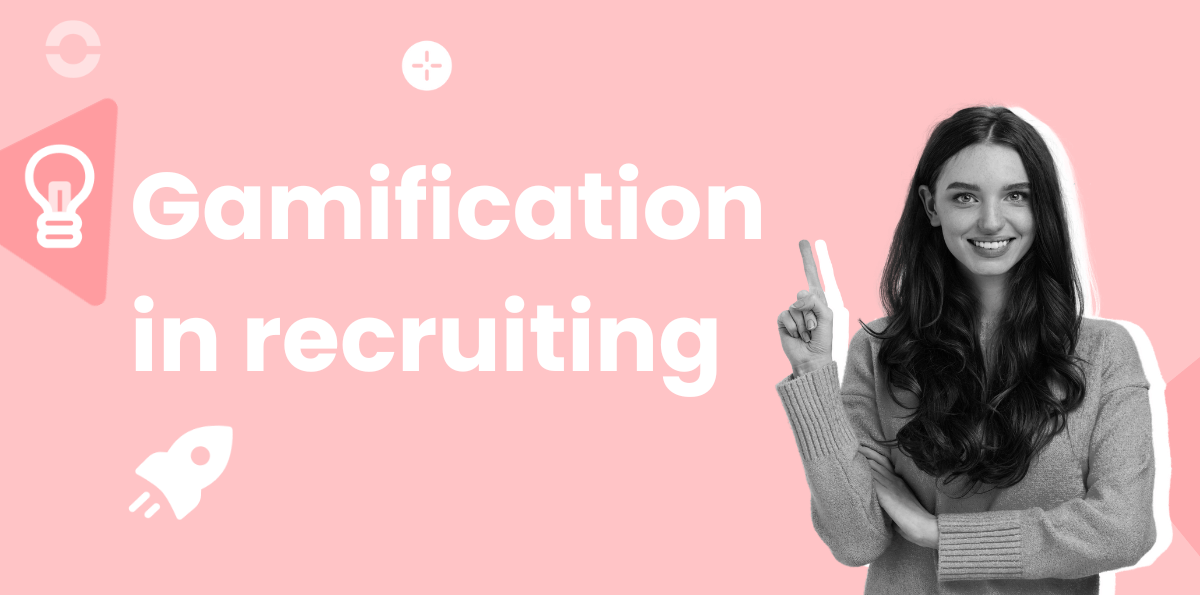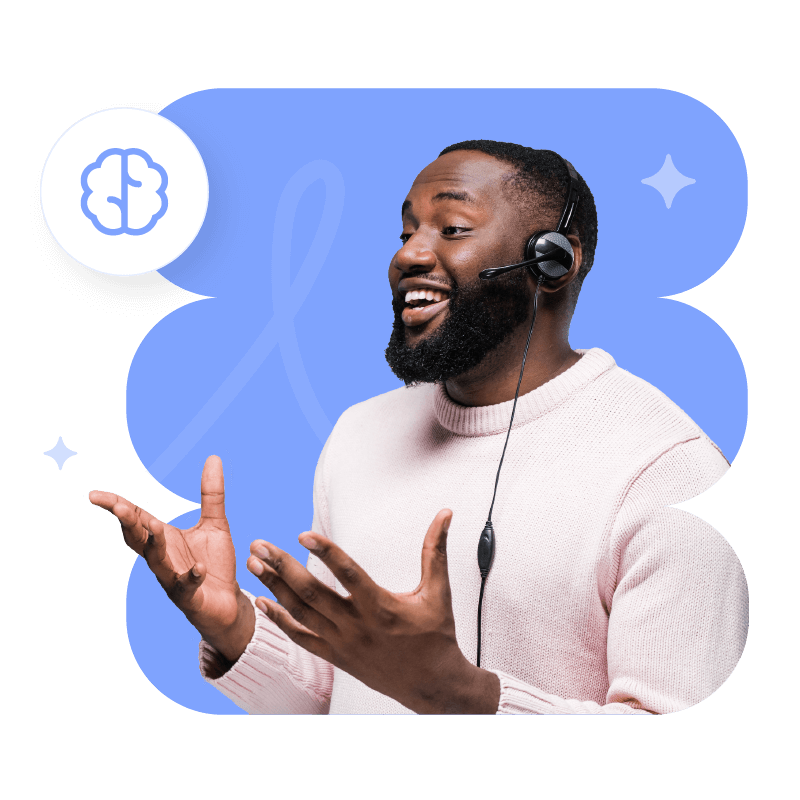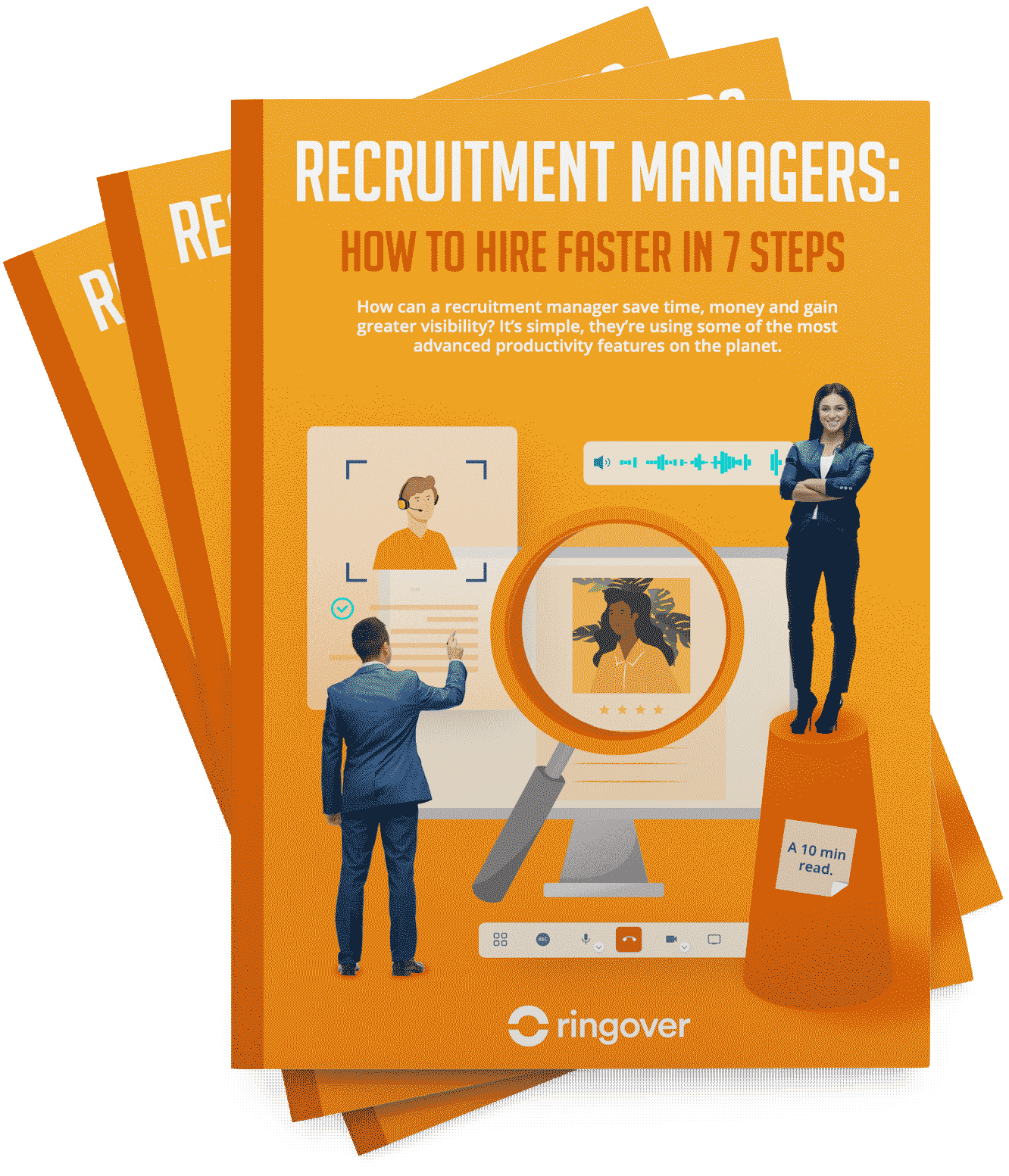Summary
- What are the most significant trends when it comes to using AI and gamification in recruiting?
- How can you use gamification to boost recruiter performance?
- How can recruitment technology be effective for hybrid or remote teams?
- Top three tips for enhancing business development in recruitment using gamification and AI
- Conclusion
By infusing elements of game design into the recruitment process, companies are not only making the experience more enjoyable for candidates but also uncovering new ways to assess skills, cultural fit, and potential. In this article, we will look at the expert insights provided by Ringover and OneUp on how to implement and benefit from gamification in recruitment.
What are the most significant trends when it comes to using AI and gamification in recruiting?
Automation ✅
AI-powered automation is revolutionising recruitment processes by handling repeatable, time-consuming tasks. This allows staffing agents to focus on more strategic actions, such as candidate relationship management and candidate sourcing. Tasks such as resume screening, interview scheduling, and candidate follow-ups can be efficiently managed by AI systems, which increases productivity and reduces time-to-hire. Moreover, chatbots and virtual assistants are increasingly used to provide real-time responses to candidate queries, ensuring a seamless and responsive recruitment process.
Data-Driven Decision Making ✅
The effectiveness of AI tools in recruiting is highly dependent on the quality of data they process. Good, clean data is essential for fostering predictive outputs that lead to optimised hiring outcomes. Recruiters are now focusing on building a wealth of data and ensuring it is accessible to AI tools. This involves not only collecting comprehensive candidate information but also maintaining its accuracy and relevance. By leveraging big data analytics, recruiters can identify patterns and trends, predict candidate success, and make informed decisions that enhance the overall hiring process.
Business Development ✅
AI and gamification are also transforming business development (BD) in recruitment. Enhanced communication and deeper insights are now achievable through AI tools that analyse interactions and feedback. Gamification, which has traditionally existed in the form of competitions and incentives, is being redefined through technology. As markets become more competitive and BD becomes more challenging, relying solely on client relationships is no longer sufficient. Instead of randomly creating incentives, recruiters are now leveraging data to strategically time competitions and incentives for maximum impact. Tools that allow for A/B testing can compare the effectiveness of different strategies over time, enabling recruiters to refine their approaches based on empirical evidence.
For example, AI can analyse market conditions, candidate behaviours, and historical data to suggest the best times to run a competition or place an incentive. This data-driven approach ensures that incentives are not only timely but also tailored to the specific needs and behaviours of the target audience, thereby enhancing engagement and success rates.
AI-based conversation intelligence software can support recruiting and staffing business development by giving you greater insight into both clients and candidates, analysing large amounts of unstructured data to find patterns that would otherwise be missed.
Mitigate Performance Fluctuations
Gamification helps drive consistent performance regardless of market conditions. Motivation, often fleeting and unpredictable, can be effectively managed through gamification, providing a level of control over it. For instance, during periods of low motivation, such as the end of a quarter, launching a business development (BD) competition focused on bringing in new deals can keep recruiters engaged when they would typically be focused on closing existing deals. This approach ensures a robust pipeline, allowing recruiters to start strong in the new period and decreasing the peaks and valleys of performance cycles. By keeping recruiters focused on the entire cycle, not just one phase at a time, gamification helps maintain steady performance levels.
Understand Your Candidate Pipeline
AI and gamification offer deep insights into the candidate pipeline, identifying which stages are strong and which need improvement. Analytics tools can pinpoint areas where coaching is needed. For example, using a tool like Ringover, recruiters can monitor and record calls to understand what drives successful metrics. Leveraging AI hiring tools like Empower, which uses sentiment analysis to identify emotions and other metrics such as speaking turns, recruiters can coach their teams more effectively. This conversation intelligence software helps improve agent performance by identifying best practices from top performers and disseminating them across the team.
How can you use gamification to boost recruiter performance?
Leverage Data for Targeted Incentives
Understanding your data is crucial for identifying areas of excellence and lag. For instance, if improving the average contract value (a common SaaS metric) is a goal, create incentives that reward large contract values. By isolating periods of consistent underperformance, you can design competitions and incentives to level out performance fluctuations. Testing different prizes helps determine what motivates agents the most, ensuring that incentives are effective.
Design Appropriate Competitions
Competitions should be of appropriate length to maintain excitement while giving agents enough time to accomplish their goals. Short competitions work best for goals like calls and meetings, while longer competitions might be more suitable for revenue or placements. The key is to keep the engagement high and the objectives achievable within the set timeframe.
Start Small
Begin your AI strategy with manageable, smaller-scale projects. This approach allows you to test the waters without overwhelming your team or resources. Identify a specific area of your recruitment process that could benefit from AI, such as resume screening, interview scheduling, or candidate sourcing. Implementing AI in these areas can provide immediate, tangible benefits and serve as a proof of concept for broader applications.
Build a Solid Data Foundation
The effectiveness of AI tools hinges on the quality of the data they process. Before integrating AI, ensure you have a solid foundation of clean, structured data. This includes comprehensive records of candidate interactions, resumes, interview feedback, and hiring outcomes. Tools like Empower can be invaluable here, as they turn unstructured data, such as phone calls, into structured, actionable insights by automatically transcribing and summarising them. This enriched data set can significantly enhance the predictive accuracy of your AI applications.
Choose the Right AI Tools
Selecting the right AI tools is crucial for the success of your AI deployment. Look for tools that are user-friendly and easily integrate with your existing staffing technology stack. Consider tools that offer features tailored to your specific needs, such as candidate screening, chatbots for initial candidate engagement, or sentiment analysis for interview performance. Ensure these tools can handle the volume and complexity of your recruitment data.
Train Your Team
Introducing AI into your recruitment strategy requires your team to be on board and well-prepared. Provide comprehensive training on how to use AI tools effectively. Highlight the benefits of AI, such as increased efficiency, better candidate matching, and enhanced decision-making capabilities. Address any concerns or resistance by demonstrating how AI can augment their work rather than replace it.
Monitor and Evaluate
Once you've implemented AI in a specific area, closely monitor its performance. Collect feedback from your team on the usability and impact of the AI tools. Use analytics to evaluate the outcomes, such as the quality of hires, time-to-fill positions, and candidate satisfaction. This data-driven evaluation will help you understand the effectiveness of your AI integration and identify areas for improvement.
Scale Up Gradually
After successfully integrating AI into one aspect of your recruitment process, gradually expand its use to other areas. Use the insights and lessons learned from your initial implementation to refine and enhance your AI strategy.
How can recruitment technology be effective for hybrid or remote teams?
The rise of hybrid and remote work models has transformed the recruitment landscape, necessitating the use of advanced technologies to maintain productivity, team cohesion, and performance. Recruitment technology plays a pivotal role in ensuring that remote teams can work effectively and stay connected. Here are key ways in which recruitment technology can enhance the performance of hybrid or remote teams:
Building a Performance-Driven Culture Through Gamification
Gamification fosters a culture of performance, balancing competition, support, team spirit, fun, and excellence. By integrating game-like elements such as leaderboards, badges, and rewards into the recruitment process, agencies can motivate their teams to achieve targets and exceed expectations. This approach not only drives individual performance but also promotes a healthy competitive spirit and collaboration among team members, even when they are not physically co-located.
Enhancing Communication and Knowledge Sharing with VoIP and Video Tools
Remote work can hinder the natural flow of information that typically occurs in an office setting. However, VoIP software like Ringover, which offers unlimited calling and video conferencing, bridges this gap. These technologies enable agents to communicate seamlessly, conduct virtual meetings, and share knowledge as if they were in the same office. Regular video check-ins and virtual collaboration sessions help maintain a sense of team unity and ensure that all team members are aligned with the agency's goals and processes.
Leveraging Data Analytics for Improved Decision Making
Recruitment technology equipped with advanced data analytics capabilities provides valuable insights into team performance, candidate pipelines, and overall recruitment effectiveness. Tools like Empower, which can transcribe and summarise unstructured data such as calls, convert these interactions into actionable insights. This data-driven approach allows managers to identify trends, pinpoint areas for improvement, and tailor strategies to enhance performance across the board. By having access to real-time data, remote teams can make informed decisions quickly, ensuring that they remain agile and responsive to changing market conditions.
Maintaining Team Engagement and Morale
Engaging remote teams can be challenging, but technology offers innovative solutions to keep morale high. Virtual team-building activities, online training sessions, and interactive workshops can be organised through various platforms, ensuring that team members feel connected and valued. Gamification elements can also be used to celebrate milestones and recognize achievements, reinforcing a positive and motivating work environment.
Facilitating Continuous Learning and Development
Recruitment technology enables continuous learning and development for remote teams. Online training platforms and e-learning modules allow recruiters to enhance their skills and stay updated with industry trends. Regular webinars and virtual training sessions ensure that remote agents have access to the same learning opportunities as their in-office counterparts, promoting a culture of continuous improvement and professional growth.
Integrating gamification and incentives into your recruiting or sales teams can significantly boost performance and morale. However, they are just one part of a broader strategy that encourages high performance. Here's a step-by-step guide to effectively integrating these elements into your team culture:
1. Align with Company Culture and Team Dynamics
The first step in integrating gamification and incentives is to ensure they align with your company's culture and the natural inclinations of your staff. Tailor your initiatives to match what motivates your team. This might involve some trial and error, but understanding your team's preferences is crucial for success.
2. Mix Short-Term and Long-Term Competitions
A balanced approach combining short-term and long-term competitions works best. Short-term competitions can focus on immediate goals such as scheduling appointments with new leads, while long-term objectives can be linked to broader goals like total revenue or naming a "Recruiter of the Year." This mix ensures that there are always attainable goals to strive for, keeping motivation high at all times.
3. Foster Team Spirit with Group Competitions
Creating team-based competitions, such as pitting team versus team or office versus office, can foster a sense of camaraderie and team spirit. This approach prevents individuals from feeling discouraged if they believe they have no chance of winning a solo competition. Instead, it encourages collective effort and mutual support, aligning everyone towards common goals.
4. Set Clear Rules and Goals
For gamification to be effective, it's essential to have clear competition rules, specific performance goals, and well-defined boundaries. Ensure that all participants understand the objectives and what is required to succeed. Technology can aid in this process, providing tools for communication, such as text messaging and professional emails, and reporting dashboards that allow agents to track their progress in real-time.
5. Utilise Technology for Communication and Tracking
Leverage technology to keep everyone informed and engaged. Use outreach tools for regular updates and reminders, and deploy reporting dashboards that allow team members to monitor their own progress and compare it with their peers. These tools help maintain transparency and accountability, essential components of any successful gamification strategy.
6. Ensure Alignment with Business Objectives
Every competition and incentive program should be aligned with the overarching business objectives. This ensures that the gamification efforts contribute to the strategic goals of the company. Regularly review and adjust the competitions to ensure they are driving the desired outcomes.
7. Continuously Review and Adjust
Finally, continuously review the effectiveness of your gamification and incentive programs. Gather feedback from your team, analyse performance data, and be prepared to make adjustments. What works at one time might not be as effective later, so remain flexible and responsive to ensure ongoing success.
Top three tips for enhancing business development in recruitment using gamification and AI
1. Embrace AI and Gamification with a Strategic Approach
To successfully integrate AI and gamification, start by keeping it simple but remain open to exploring new possibilities. Invest in comprehensive training for your team to ensure they are comfortable and proficient with the new tools. Develop a clear process map for implementation, and actively seek feedback from your agents to refine and improve the system. This participatory approach helps in creating a system that meets the needs of your team while driving desired outcomes.
2. Be Data-Driven and Continuously Improve
Data is at the heart of effective AI and gamification strategies. Continuously improve your data inputs and processes to enhance the quality of your outputs. Employ A/B testing to iterate and refine your approaches, ensuring that your strategies are always based on solid evidence. By frequently changing competition elements such as prizes, team configurations, and formats, you can identify which aspects contribute to strong or weak results. This iterative process helps in optimising your gamification initiatives, making them more effective over time.
3. Leverage the Right Technology
Investing in the right recruitment technology is crucial for maximising efficiency and effectiveness. Conduct thorough research to find the best tools that align with your business needs. Use technology to streamline the entire recruitment process, from candidate sourcing to final placement. Advanced tools can automate repetitive tasks, provide valuable insights through analytics, and enhance communication and collaboration within your team. By leveraging technology, you can achieve more with less time, freeing up resources to focus on strategic business development activities.
Conclusion
Enhancing business development in recruitment through gamification and AI involves a strategic blend of embracing new technologies, being data-driven, and leveraging the right tools.
If you are curious to discover what a difference AI and gamification in recruiting can make for your business, begin your free seven-day trial for Empower by Ringover. Without even having to enter your credit card information, you'll get access to this powerful software that can supercharge your recruitment business development.




